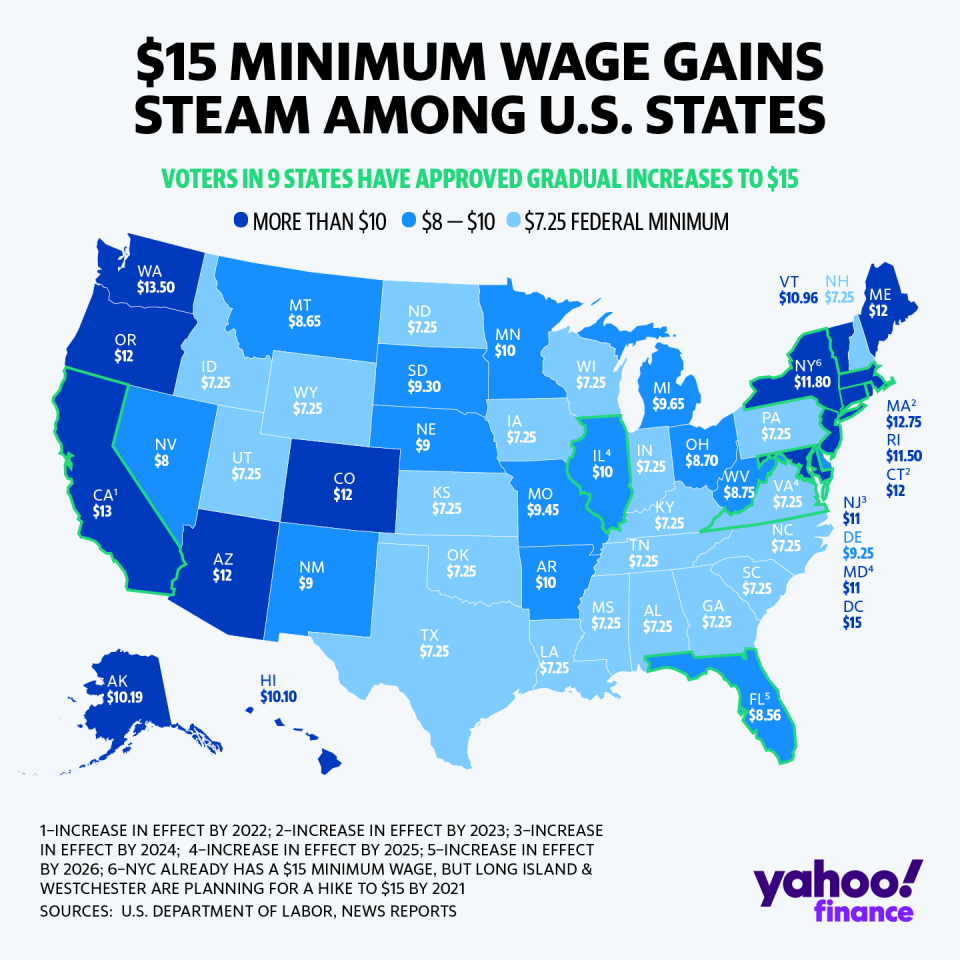Biden’s daunting challenge on jobs
Like most incoming presidents, Joe Biden promised to do more for struggling workers and families falling behind. And like most presidents, he’ll probably have little to show for it after 4 years of trying.
New research from the Massachusetts Institute of Technology documents pernicious trends of the last 40 years that have hollowed out the middle class and depressed living standards in much of the U.S. economy. “Over the last four decades, we’ve had a lot of economic growth, but it hasn’t really reached the median worker,” David Autor, co-chair of MIT’s Work of the Future Task Force, told Yahoo Finance on Nov. 24. “It’s been very concentrated at the top, If we do that for the next four decades, it will not be a good outcome and most of us will not benefit.”
The MIT research echoes other work in identifying the broad causes of worsening wealth and income inequality. The digital revolution rewards workers with technical skills but makes lower-skilled workers easier to replace with machines. Globalization makes it far easier for producers to move work overseas. And protections for workers, such as unions and minimum wage laws, have gotten progressively weaker. The U.S. economy remains remarkably efficient and productive, but ordinary workers don’t share in those gains the way they used to.
Solutions are complicated. Other developed economies have enjoyed productivity gains similar to those in the United States during the last 40 years, with higher pay and better benefits for lower tranches of workers. In Denmark, for instance, burger flippers at McDonald’s start at about $22 per hour, with 6 weeks of paid vacation and other benefits. The government provides health care coverage. By most such measures, American workers fare worse than those in other developed nations. So it’s possible and even common in the modern economy to spread prosperity more broadly than we do in the United States.

Biden has a broad economic plan that starts with getting the coronavirus under control, so businesses can reopen safely and start hiring back laid-off workers. Beyond that, Biden wants to use government purchasing power to beef up U.S. manufacturing, while creating millions of jobs in the new green-energy economy. He’d locate many of those jobs in the same energy patches that now support oil and gas drilling jobs. New infrastructure spending would provide many additional jobs. And new subsidies for health insurance would help families better manage what is often their biggest expense.
No bipartisan agreement on addressing wealth inequality
Most of this would require Congress to pass new legislation, which leads to the same cul-de-sac the government has been stuck in for years: there is simply no political agreement on how to address America’s prosperity problem, even if economists see solutions. The federal minimum wage is a clear example. A logical policy would be to set it near its historical average, adjusting for inflation, and then allow it to change automatically every year, the way Social Security payments have an annual cost-of-living adjustment. Instead, business groups have persuaded (mostly Republican) members of Congress to keep the wage stagnant, and Congress hasn’t raised it since hiking the wage to $7.25 in 2009. Inflation has risen 23% since then, so the purchasing power of a minimum wage worker today is 23% lower than it was in 2009.
Other solutions require institutional changes: Reforming unemployment insurance to cover more gig workers and self-employed people. Strengthening unions and providing more leverage for service-economy workers like at-home caregivers who have little standing to demand better pay. Provide more training and education in fields where employers do need more workers, such as medical technicians and 3D printing. Health care is a huge economic issue, because of all the workers who seek or keep a job simply to get insurance. Detaching health insurance from work would free millions to pursue new careers they might be better at.
“It’s not an immediate reversible trend,” Autor says. “We’re not going to get out of it quickly. But there’s opportunity to bend the curve over time.”
Action at the state and local level is a more encouraging than the inaction in Washington. In Colorado, Georgia, South Carolina and other states, governments are linking local employers with high schools and community colleges to formulate training that prepares students for real-world jobs that offer a path to middle-class living standards. Detroit has new training programs for assembly line auto workers to upgrade their skills in fields like engineering and design, where they can earn more.
New technologies themselves can create new opportunities to get ahead. Robotics, artificial intelligence, self-driving cars and other coming breakthroughs probably will eliminate some jobs. But the MIT research asserts that those disruptions are developing more slowly than many expect, and creating new jobs that often pay more. Self-driving vehicles could kill some driver jobs, for instance, but they also require new safety supervisors with some technical training and better prospects for pay raises and promotions. New technology has always created new jobs while killing old ones, and there’s no reason to think that pattern will change. The challenge for Biden and other policymakers is enlarging the supply of new jobs while taking better care of those who get disrupted out of theirs.
Rick Newman is the author of four books, including “Rebounders: How Winners Pivot from Setback to Success.” Follow him on Twitter: @rickjnewman. Confidential tip line: [email protected]. Encrypted communication available. Click here to get Rick’s stories by email.
Read more:
Get the latest financial and business news from Yahoo Finance
Follow Yahoo Finance on Twitter, Facebook, Instagram, Flipboard, SmartNews, LinkedIn, YouTube, and reddit.
